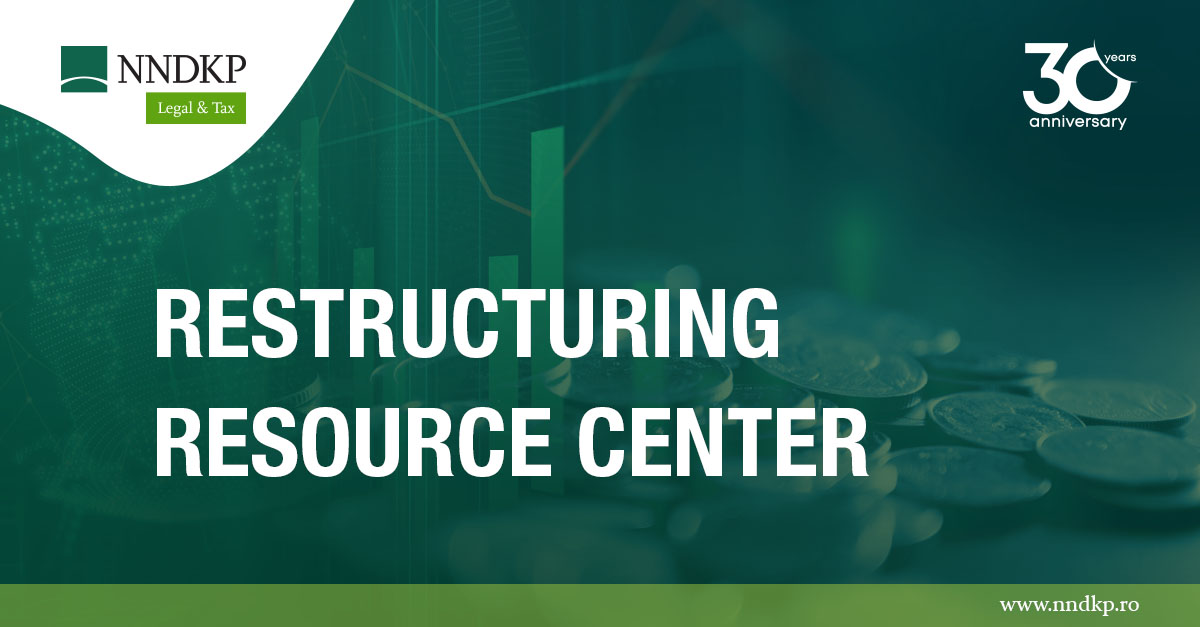
Restructuring Resource Center
Up to date information and insights on restructuring and turnaround issues in Romania
The PDF version of the Restructuring Resource Center may be downloaded here.
At this time, there is an intense debate on the Romanian market right now with regard to measures to be taken, in the context of the abrupt economic downturn, which is rapidly unfolding in the aftermath of the coronavirus prevention measures.
Voices range between very conservative/austerity prone, basically underlining the low capabilities of Romania to take measures similar to states which are more wealthy, to others, more progressive, which are far more vocal with regard to ramping up liquidity measures through fiscal and monetary measures, and including some asking for a bold increase in public debt, for immediate but also for longer ranging objectives (funding large public projects to take the country out of recession on the medium term), in an attempt to counterbalance the loss in internal demand by an increase in government spending and investment.
Regardless of the debate, there seems to be a large consensus that business continuity must be assured, after the medical crisis is over. That is, that businesses will be able to “restart” properly and quickly, without shutting down forever, as “collateral damage” of the war against the virus.
As a direct and indirect result of the medical crisis and the safety measures being taken, the whole economy is coming to a halt. There is a liquidity crisis (as pressure on cash flows is mounting) as well as an actual economic crisis (recession), due to a drop in both in demand and supply (simply less value is being created).
Financial vs economic crisis
First, liquidity is being addressed. However, even assuming this is being resolved by the state, the banking system and the corporate sector (which is a very ambitious assumption), we will still be left with the reality of a smaller economy, when this is all over. We’ve been through a financial crisis about a decade ago (focusing chiefly on absence of liquidity), but this one is likely to be an economic crisis.
Absence of very substantial increases in government spending and large infrastructure investments in all areas (hospitals, schools, energy), come September it is likely that we will have a smaller economy, and the financial intermediation within that economy needs to be restructured, re-correlated with the new reality.
Too early vs too late in restructuring
The conclusion of standstill agreements between companies and banks to first address liquidity is necessary, particularly because of risks. Following the liquidity issue, restructuring, including substantial debt restructuring will be a feature of the Romanian economy.
If that is already clear now, there are actual effective steps which need to be taken now. Important steps. Much like in the medical crisis, the volume of non-performing companies for which there will be no solution at the end of the year depends on what is done now to prevent that.
Please check out our resources
You can check legislative and administrative measures and official communications here.
Read about important issues affecting restructuring here:
- A New Wave of Insolvencies? Possible Preventive Restructuring Measures in the Implementation of the European Directive on Preventive Restructuring
- How the “coronacrisis” is causing insolvency and financial difficulty and the law does not address this
- The world will be “under water” for the next 6 months. Is your organization “watertight”?
- Beyond Non-Payment: How Are Credit Agreements Impacted by COVID 19 measures?
- Brief analysis of the moratorium ordinance
Access our Emergency Financial Restructuring Kit.
The Financial Restructuring Team
Our dedicated Financial Restructuring Team includes finance, restructuring and insolvency, tax and employment specialists dedicated to protecting your interests.
We use a wide range of specialist knowledge and backgrounds and a single point of contact and coordination to make sure you get the best value as possible, as fast as possible.
Please meet our coordinators:

